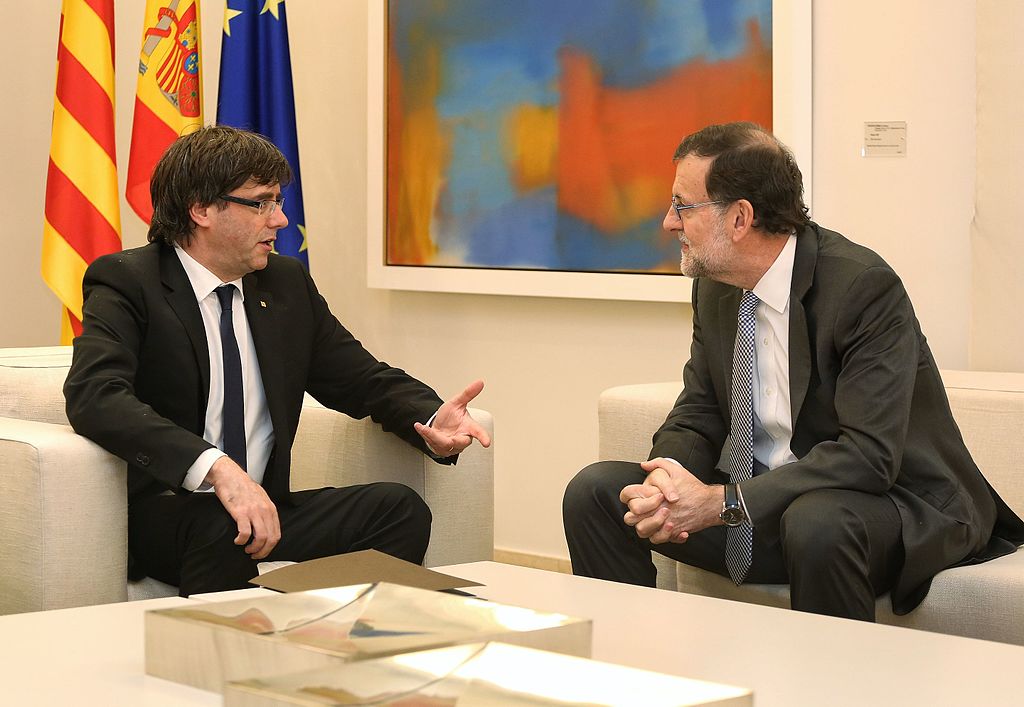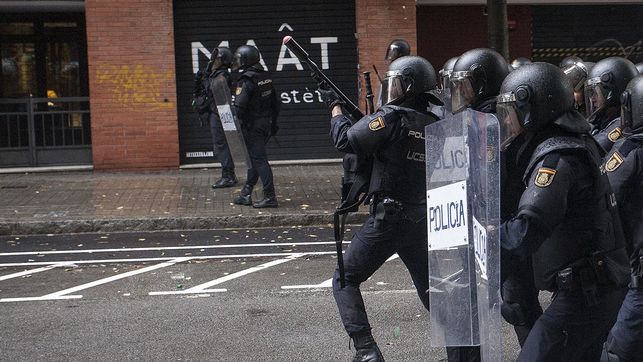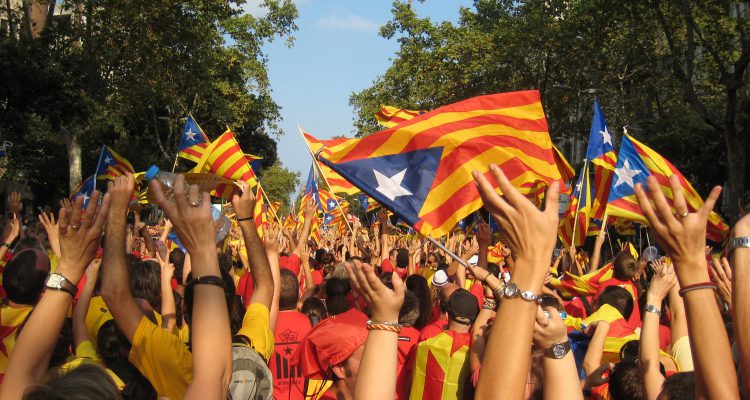By: Patrick W. Zimmerman
“What the hell is going on in Spain,” you’ve been asking yourself, “and where can I get an explanation that doesn’t assume I already know?”
Have no fear. I’ve got you covered. Because I knew that PhD dissertation on contemporary nationalist movements in Spain would become a hot topic 6 years later. Totally.
The Catalan Crisis: the short-short version.
The demographic background
Barcelona is in Catalunya, one of the 17 Autonomous Communities that make up Spain. They’re kind of like states, but some of them (like Catalunya) have way more self-government than, say, Texas does. The current situation is a lot more like Québec’s or Scotland’s relationship of to the central government than it is like Pennsylvania’s or Virginia’s.
There’s a separate language, català, spoken habitually by 43.1% of residents over 15 as of 2013, which is related to Spanish but distinct from it (think Spanish to Portuguese to Italian. Native speakers of one can understand a lot of any of the others, but speaking is harder).
It’s one of the more prosperous regions, with a GDP per capita 19.3% higher than the national average (as of 2016) and growing 0.3% faster than the national average. Thus, you’ll hear Catalans making some of the same arguments the Californian independence movement does about subsidizing the rest of the country.
A lot of people have asked me if this is a reaction against multiculturalism, similar to Brexit (and Trumpism). Ehhhh….not really. Catalan separatists generally want to join the EU, not leave it. Europe is often seen as the way to bypass Madrid and the common market a critical component of a viable independence plan.
The super-fast historical background
Catalan nationalism started as a bourgeois movement that appeared as part of the 19th century rise in ethnonationalism (the Catalans were just one of a lot of groups attempting to figure out how to make its particular ethnic “nation” match up to the boundaries of its political borders, with varying success.)

Generalísimo Francisco Franco. Dictator. Ultra-nationalist. Asshole.
Further complicating things, most peripheral nationalisms in Spain have been pretty strongly identified with the left since 1939. Basically, because Franco and his 40-year right-wing authoritarian regime (1939-78) that was (sorta, sometimes) fascist, (really really) nationalist, and (mostly) conservative Catholic. Since the dictatorship became (and still is) so strongly linked with Spanish nationalism, it created a strong political link between alternative national identities and the antifranquista opposition.
Before the dictatorship, there were regionalisms and nationalisms of both flavors. Catalanisme was primarily center right at first, focused on protectionism of Barcelona’s textile exports to Latin America. By the 1930s, a left-wing republican version of catalanisme had also arisen, with the Esquerra Republicana de Catalunya of Lluís Companys during the Spanish Second Republic (1931-9, ish). Companys declared a Catalan Republic within a Spanish Federation in October 1934 and was fired and jailed (sound kind of familiar?). Franco’s uprising and victory in the Civil War (1936-9) kind of made the discussion moot for while, of course).
This association of separatism with the left is pretty strongly reinforced by the current conservative party, which was started by Franco’s minister of propaganda (Miguel Fraga Ibarne). There was never a cleaning out of the Franco regime (even in a “you’re fired” sense). The Transición española was more like a negotiated evolution from authoritarianism to a constitutional monarchy, after which everyone agreed to never speak of the bad old days again. King Felipe VI’s (2014-pres.) constitutional powers actually derive from Franco, who nominated Juan Carlos (Felipe’s dad) as his successor.
The October 1st independence referendum

Voting in one of the stations not shut down by the police. (Image credit: Alberto-g-rovi)
So, the situation up to about 3 months ago was that just under half of the Catalans were at least mildly pro-independence.
Puigdemont, the regional president proposed a referendum October 1st which the Spanish Court declared unconstitutional. The Catalan Generalitat (the regional goverment) held it anyways, and Mariano Rajoy (the Spanish PM), sent in the Guardia Civil and the national police to shut down (many) of the polling stations, physically dragging people away and (likely) using rubber bullets on unarmed would-be-voters / protestors.
Many people who would have voted no, chose to not legitimize the vote at all by participating in what was technically an illegal activity, so the “90% voted yes” claim means “90% of those who cast ballots,” but far, far from “90% of the population.” And you thought that turnout was important in American elections.
The referendum’s official turnout ended up about 2.27 million of 5.38 million eligible voters. Using the 2016 general elections as a baseline, some 1.2 million people stayed home either in protest, out of fear of the police, or out of apathy (turnout was 2,266,498 in the referendum v. 3,486,069 in the 2016 elections). That turnout and the 90% pro vote more or less matches up to the following scenario: most of the pro people voted, most anti didn’t, and a significant portion of people who either were apathetic or don’t vote stayed home. That’s more or less in line with the idea that an obligatory plebiscite on October 1st would have yielded somewhere a little south of 50% support for independence.
Three days after the referendum, on October 4th, Felipe VI (the King) got grumpy at his rebellious subjects and poured a little gasoline on the fire. He’s the head of state of the Kingdom of Spain; the Catalan parliament declared itself a Republic. You see the conflict, there.
The waiting game
At that point, Puigdemont basically stalled for a month.
On October 10th, he declared independence but then suspended the declaration in one of the more weirdly convoluted political statements of all time.
The following day, Rajoy and the Spanish government gave a deadline to Puidgemont and the Catalan Generalitat to clarify the situation (read: retract it all and be happy Spanish citizens) of Monday October 16th.
Meanwhile, Puigdemont probably hoped that Europe would intervene. Rajoy handled this whole thing in an idiotically heavy-handed way (see police crackdown on vote, rubber bullets, basic chaos), solidifying the previously pretty-fragmented nationalist groups in Catalunya.
During this period, both sides were waiting for the other to blink first. And neither did so.

Puigdemont (left) and Rajoy, talking, back in 2016 when they still did that. (Image credit: Generalitat de Catalunya)
October 27th: deadline day
Puidgemont missed the original deadline, and Rajoy extended it to Friday October 27th.
That morning, the Catalan Parlament voted for independence. Within 45 minutes, the Spanish Senate had voted to suspend the Statute of Autonomy (applying the never-before-used Article 155 of the 1978 constitution).
The next day (Saturday October 28th), Rajoy fired everyone, as expected. 140 regional officials plus the head of the Mossos (the regional police / national guard), plus their aides.
Monday October 30th, Puidgemont and 4 of his cabinet fled to Brussels (Antoni Comín, Clara Ponsatí, Meritxell Serret, and Lluís Puig), and Tuesday much of his government was charged with rebellion and sedition.
8 of the ministers that did not go with Puigdemont to Brussels were arrested on Thursday November 2nd, and the 5 exiles were summoned to appear to give testimony. Shockingly, they failed to return to Madrid from Brussels as ordered by the court, prompting the Spanish court to issue a European arrest warrant for the exiles on Friday the 3rd.
Puigdemont and his ministers surrendered to Belgian police on Sunday morning November 5th, and were conditionally released later that evening pending the ruling by a Belgian court on Spain’s extradition request. The conditions were relatively light: that they had to remain in Belgium and keep a fixed permanent address while the court deliberated.
The current situation
So, it’s complicated, but Rajoy really screwed it up. And Puigdemont is playing chicken with 7.5 million people’s lives and livelihoods.
So this is where we’re at right now:
- Anything from peaceful separation of a state within the EU to bloody Civil War #2 is on the table, with both those endpoints unlikely but not impossible.
- The Mossos d’Esquadra is probably pro Independence, and could serve as the start of a Catalan military, but right now, it would get stomped by the real army.
- Puidgemont and his Catalan government in exile have declared that they will contest the upcoming elections mandated by Spain on December 21st. In the meantime, Catalunya is under direct rule from Madrid.
- Puigdemont and the exile ministers await the ruling of the Belgian court, which will come within 13 days (15 days of Sunday’s release).
- If the court decides to not honor the warrant issued in Spain, then the likelihood is that they set up temporary shop in Brussels, trying to sway international opinion with public claims that supporting the Catalan cause is equatable to a defense of democracy and basically annoying the hell out of Madrid.
- If the court decides to honor the warrant, Puigdemont and Co. will almost certainly appeal the extradition, which will tie things up for (probably) several months….during which they will try to sway international opinion with public claims that supporting the Catalan cause is equatable to a defense of democracy and basically annoying the hell out of Madrid.
- Either ways, it is very likely that Puigdemont will not be convicted before December 21st, and thus eligible to run as the independence candidate in the upcoming Catalan elections.
What now?
My money is on Puigdemont is playing for martyr status, hoping over the long-term to push support for Catalanisme into a clear majority from exile (or prison, depending on the outcome of the extradition decision) and make its independence a political inevitability in 30 years. My confidence level on this is maybe 30%. It’s pretty wide open. I’ve been going back and forth with some Catalan friends, basically asking, “What next?” A lot of them thought Rajoy would blink or Angela Merkel would step in, though I was pretty sure neither was that likely.
Playing chessmaster, if Puigdemont’s goal is an independent Catalunya now, his strategy sucked. If his goal was to make Catalunya’s long term future within Spain look like an occupation (rather than a sometimes-working compromise like Québec) and therefore untenable politically, the strategy is decent.
The main question right now is: How does Rajoy enforce direct rule? And who do the various parts of the Catalan State decide to listen to? Will Belgium honor the request for extradition of Puigdemont and his merry Gereralitat-in-exile. And if so, how long would the appeals process take? How much can appeals by Puigdemont during his time in Belgium sway the International community, if at all?
The obvious option for Rajoy is setting up a provisional “official” administration and putting all the resources of the state behind unionist parties for the new vote on Dec 21. The stupid option is to send in the army to bring the rebel community under control. He’ll probably take the first tack….but Rajoy is pretty stupid.

National Police in riot gear. October 1st was probably not the last we’ve seen of this. (Image credit: Robert Bonet: El Diario)
The next deadline
Technically, the Belgian court has until November 20th to decide if Puigdemont and his cabinet will be extradited to Spain, but the inevitable appeals will make that drag out long past that deadline. The real date to watch out for is December 21st. Get your popcorn ready.
Many thanks to Andrew H. Lee and James Stout for their feedback on this piece. I love that I get to bounce ideas off of you and you can filter out the crazy.


No Comments on "Catalunya in crisis, translated for the confused American who thought Barcelona was in Spain"